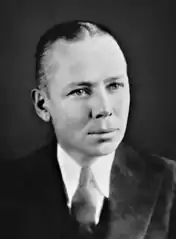Jerry Buckley (journalist)
Gerald E. "Jerry" Buckley (April 5, 1891 – July 23, 1930) was an American radio commentator in Detroit, Michigan. He successfully campaigned for the recall of Mayor Charles Bowles in the wake of corruption allegations. Prior to his death, Buckley had served as an investigator for Henry Ford, and as a special investigator for the United States government.[1]
Jerry Buckley | |
|---|---|
 | |
| Born | Gerald Emmett Buckley April 5, 1891 |
| Died | July 23, 1930 (aged 39) Detroit, Michigan |
| Cause of death | murdered |
| Resting place | Mount Olivet Cemetery (Detroit) |
| Nationality | American |
| Other names | Jerry Buckley |
| Citizenship | United States |
| Occupation | Journalist/Radio Commentator |
| Employer | WMBC |
| Known for | Radio broadcasts, recall of Mayor Charles Bowles |
Radio career
Buckley began a program of commentary on a Detroit radio station, WMBC, in 1928. In an era before the adoption of Social Security in the United States, his 6 pm nightly broadcasts addressed such concerns as old-age pensions and the plight of the unemployed. He also spoke of humanitarian causes and addressed his radio audience as the "Common Herd".[2]
In 1930, Buckley's programs increasingly focused on claims of graft and corruption among various Detroit officials, including allegations of organized crime ties to then-Mayor Charles Bowles, along with the Public Works Commissioner and Police Commissioner Thomas Wilcox. Bootleggers and speakeasies operated extensively during Prohibition in Detroit, using nearby Windsor, Ontario, as a conduit to funnel liquor illicitly into the US, and gangland killings were frequent.[3] His denunciation of city government made the program Detroit's most popular radio broadcast and culminated in a successful recall of Mayor Bowles on July 22 of that year.[2]
Death and aftermath
.png.webp)
On the night of the successful recall, Buckley was approached by three men and shot eleven times in the lobby of the LaSalle Hotel in Detroit, where WMBC's studios were located.[4]
Following a funeral mass at St. Gregory’s Catholic Church, Buckley was buried at Detroit’s Mount Olivet Cemetery. Various sources place the crowd size at 10,000-50,000 or more.[2][5][6]
After his murder, Police Commissioner Wilcox alleged that Buckley was a known extortionist and racketeer who had likely been killed because of his underworld connections.[1] In his attempt to tarnish Buckley's reputation, Wilcox produced an affidavit stating that the slain radio commentator had been paid $4,000 in "protection money" by a bootlegger. The affidavit was soon dismissed as having been coerced.[2] Buckley's brother Paul, a former assistant prosecutor, claimed that the murder was orchestrated as revenge for the campaign against the mayor.[1]
In response, Michigan Gov. Fred W. Green directed the state police to investigate the murder separately from the Detroit Police Department.[5] The investigation was taken to a grand jury by prosecutor (and future Governor) Harry Kelly.[3]
Although henchmen belonging to Detroit mobster James "Blackie" Licavoli's gang were arrested, no convictions were secured for the killing.[2] The gunmen were later identified as Russell Syracuse, Joseph English, and John Mirabella.[5]
See also
References
- "Death in Detroit". Time. 1930-08-04.
- Schneider, John (September 1, 2018). "The Rabble-Rousers of Early Radio Broadcasting". Radio World. Vol. 42 no. 22. Future US. pp. 14–16.
- Walsh, Kevin (September 27, 2013). "Death of a Whistleblower: Detroit's Bankruptcy, Edward Snowden and Jerry Buckley". Huffingtonpost.com. Retrieved September 24, 2018.
- "Detroit's Question". Time. 1931-05-04.
- May, Allan (October 14, 2009). "Jerry Buckley: A Victory Short Lived". Crime Magazine. Retrieved September 24, 2018.
- Poremba, David Lee (2001). Detroit: A Motor City History. Charlseton, SC: Arcadia Publishing. p. 118. ISBN 978-0-73852-435-1.
